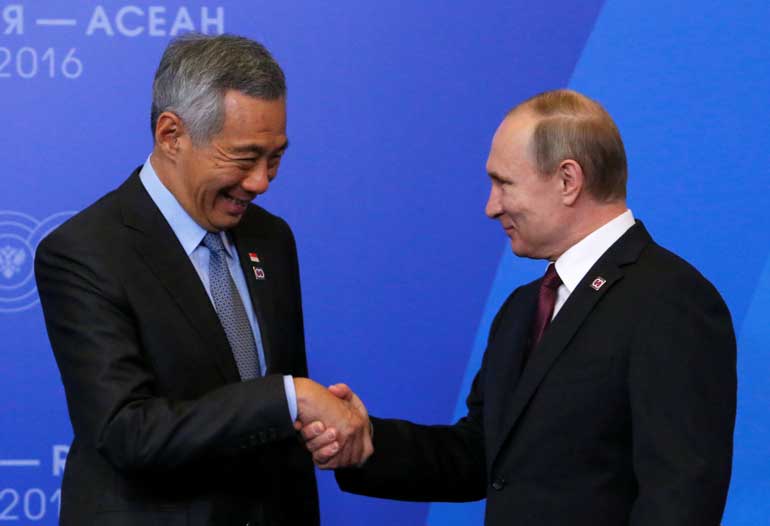Monday Feb 23, 2026
Monday Feb 23, 2026
Saturday, 21 May 2016 00:00 - - {{hitsCtrl.values.hits}}

Russian President Vladimir Putin shakes hands with Singapore’s Prime Minister Lee Hsien Loong during a welcoming ceremony for heads of the delegations at the Russia-ASEAN summit in Sochi, Russia, 20 May – Reuters
REUTERS: The Kremlin has seized on the visit by southeast Asian leaders for a summit as an opportunity to show Russia still has friends on the international stage, despite being cold-shouldered by the West over the conflict in Ukraine.
Russia has had few chances to host major international gatherings since Western sanctions were imposed, so there has been considerable fanfare around this week’s summit with members of the Association of South-East Asian Nations (ASEAN).
A special commemorative coin was minted for the occasion, Russian President Vladimir Putin flew most of his government to the Black Sea resort of Sochi to take part, and state television broadcast a prime-time report showing how cleaners were vacuuming the carpet at the summit venue in preparation.
While the formal agenda of the two-day summit that ends on Friday has focussed on building Russia’s ties with ASEAN member countries such as Vietnam, Thailand and Myanmar, it has also been conducted with an eye on the United States and Europe.
“These are difficult times. Europe and America, by declaring sanctions against us, have basically turned away from us, or turned their backs on us,” said Andrei Vorobyov, Governor of the Moscow region, part of the Russian delegation at the summit.
“But countries in the Asian and Pacific regions are working very actively with us, and that is very important, very nice,” he told a session on the sidelines of the summit.
ASEAN members range from emerging market powerhouse Indonesia to wealthy city state Singapore, but the grouping excludes Asia’s economic giants China, Japan and India.
Channel One television station, which echoes the Kremlin line, alleged that the US government had tried to dissuade some ASEAN head of government, in particular those from the Philippines and Malaysia, from travelling to Sochi, but that they snubbed Washington and came anyway.
Asked by Reuters about the television report, Russian foreign ministry spokeswoman Maria Zakharova said: “It’s true. I cannot talk about particular cases with Malaysia and the Philippines, but in general the United States always applies this kind of pressure.”
Russia had been due to host a summit of the Group of Eight industrialised nations, also in Sochi, in June 2014, but this was cancelled because Western nations objected to Russia’s annexation of Ukraine’s Crimea region.
Since then, most heads of government from major Western states have stayed away. The biggest multilateral event since then has been a gathering of BRIC nations – Brazil, Russia, India and China – in the Russian city of Ufa in July 2015.
There have been tentative signs, however, that foreign leaders are thawing towards Russia.
Japanese Prime Minister Shinzo Abe visited Putin at his summer residence in Sochi earlier this month, and Italian Prime Minister Matteo Renzi plans to attend an economic forum in Russia’s second city of St. Petersburg in June.